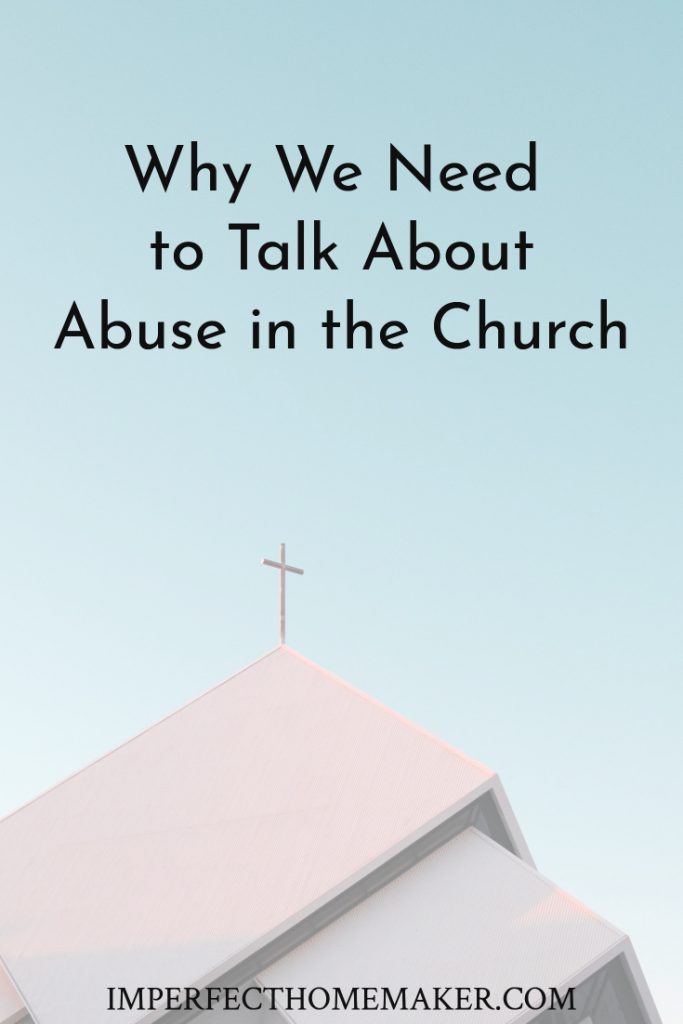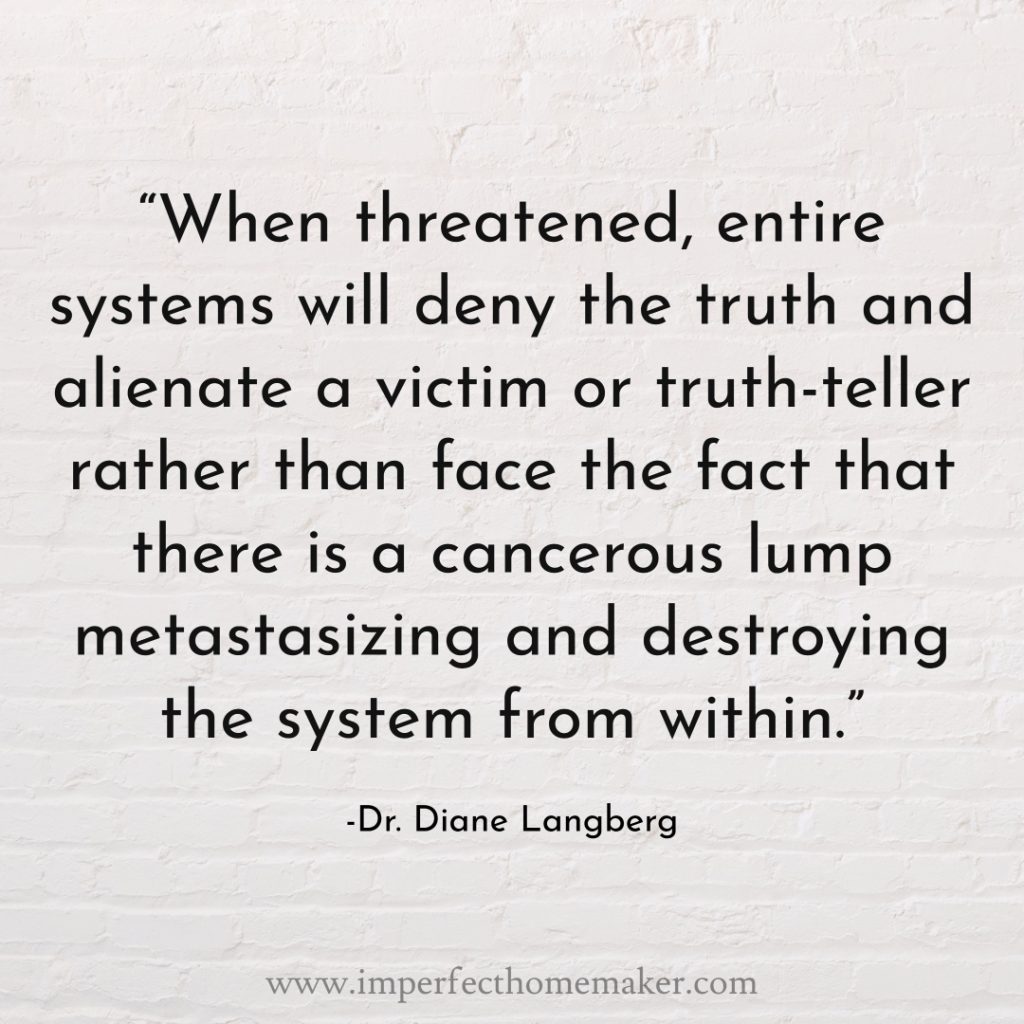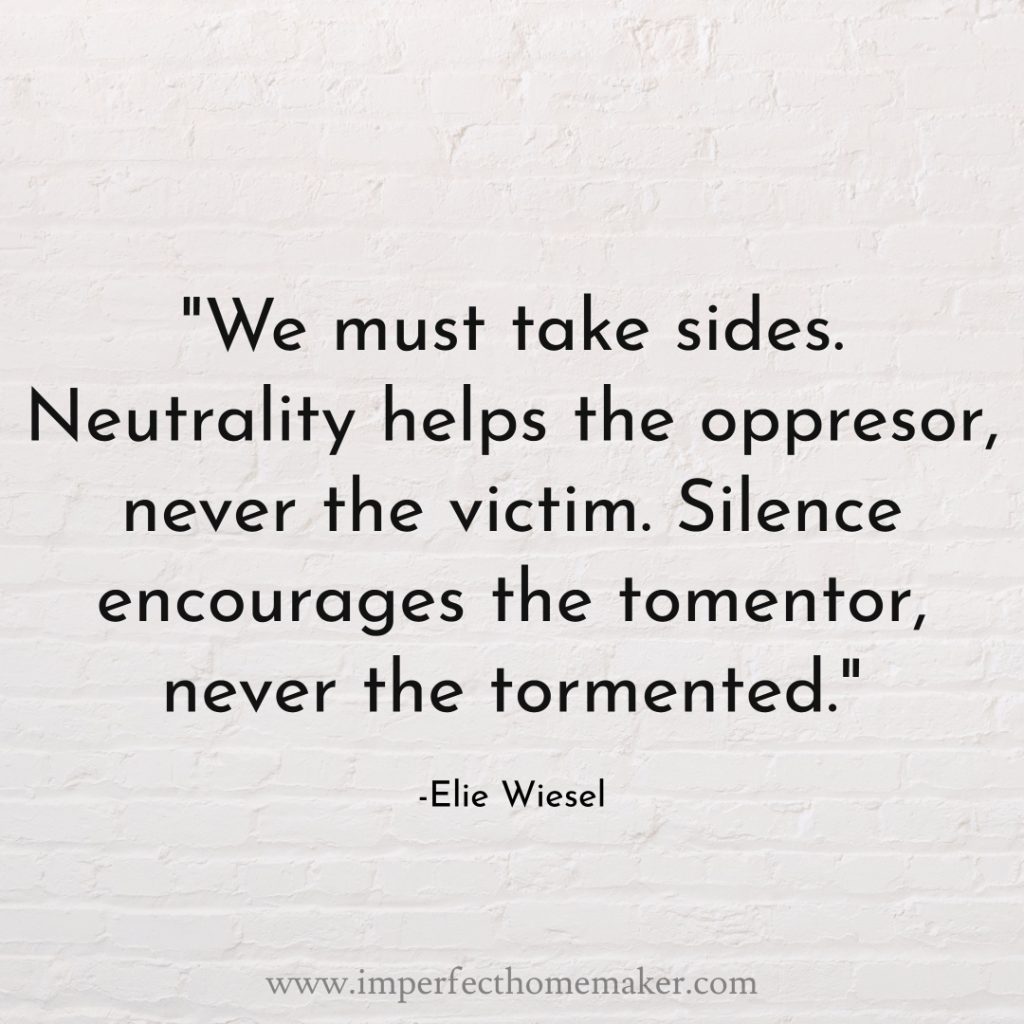Should We Talk Publicly About Abuse in the Church?
Since I have turned this platform further towards shining a light onto domestic abuse in the church, I want to address a concern that some of my readers may have.
This concern is regarding whether speaking about abuse in the church in an online format is appropriate as it may present a poor impression to unbelievers or turn them away from Jesus.
My response to that concern will be two-fold.
First, although I am sharing these things in an online context, my audience is Christians. I am writing to the members of the body of Christ, pleading with my brothers and sisters not to look away from the suffering of others.
Second, while my audience is Christians, I am aware that it’s possible that unbelievers could see what I’ve written. I will address that concern too.
So let’s get into it.
A PLEA TO THE BODY OF CHRIST
I must plead with my brothers and sisters publicly because what is taking place are offenses against the entire body. I have not been personally offended in such a way that I can go privately to a brother or sister for reconciliation. I am addressing over-arching issues that are occurring among the entire body of Christ.
These are the main issues about which I am speaking:
- Wolves among the sheep
- Hypocrites who call good evil
- Ignorance among the body of the evil among us, and of scriptural interpretations which allow it to flourish.
- Indifference to the suffering of other members of the body
Wolves among the sheep
The Bible contains warnings to believers that wolves will enter in and circulate among the flock (Matthew 7:15; Acts 20:28-30; Romans 16:17-20). These people come into the congregation for the singular purpose of fulfilling their own desires for power, fame, sex, or money. They are difficult to spot because they intentionally disguise themselves as sheep. Yet when they are spotted by discerning members of the body, or when people who have been injured by them scream out in pain, often the rest of the congregation doesn’t believe the one crying out, or they make excuses for the wolf to remain in their midst. “He looks just like a sheep to me. I don’t see why he can’t stay. Even if he hurt someone, he has apologized, and it is our responsibility to show him grace.”
It seems that many have forgotten that wolves are wolves! They are dangerous predators! Of course they look like sheep; that’s their point! They want you to let them roam freely! Don’t play into their hand.
Dr. Anna Salter interviewed pedophiles, rapists, and other sex offenders and recorded the thought processes of these types of people. One of the offenders who abused a child at church said that people did not believe the accusations and that many people stood in his defense when he was told on. He says he intentionally did good deeds like mowing the yards of handicapped people, being generous with money, and visiting the elderly to cover up the type of person he really was.
I consider people that go to church gullible because they have a trust that comes from being Christian.
He said that church people don't want to believe those types of things happen, and they especially don't want them to believe they happen in their congregation. “Because of that it was all the more easy to convince them with my good deeds.”
My friends, this is how a wolf operates. Whether someone is sexually abusing people in the church or whether they are abusing their families, they are presenting the “sheep” side of themselves in public while they are a wolf in private, devouring others for their own gain.
It is important to speak out publicly, not only to warn people of specific wolves within a specific congregation, but to sound a wake-up alarm to the body of Christ at large that they have forgotten scripture’s warnings about such wolves in sheep’s clothing.
Hypocrites in the church
Along with the wolves prowling througout the church are their enablers. These are the people who look the other way when people are suffering gross injustice. These are the people who call evil good and good evil. “Oh, he didn’t mean it.” “Your husband only cheated on you because you weren’t giving him enough sex.” “He flew into a rage because you confronted him. Everyone knows confrontation makes a man feel disrespected. What did you expect him to do?” “He said he was sorry; you need to drop the subject.”
The offender’s sin is excused and his “repentance” is praised while the victim is blamed for “inciting the abuser” and for “keeping record of his wrongs”.
These are the hypocrites who, like the Pharisees, concern themselves so much with outward appearances that they oppress others. Yet at the same time they neglect the things that matter the most. They strain at a gnat while swallowing a camel.
They excuse people who abuse and harm others while at the same time they quote I Corinthians 13:7 and tell victims they must believe the best about someone who has already proven they don’t have the victim’s best interest at heart.
Ignorance in the church
Let’s talk about those among the body who believe the Bible means what it says when it warns of wolves among the flock. But, what if they are among the gullible people that the sex offender above spoke about? Maybe they believe there are wolves, but they don’t know how to distinguish who they are. Maybe they discern that something is not right, but they lack the knowledge to deal with it well.
The majority of pastors 1. Rarely preach about domestic or sexual abuse. 2. Underestimate the pervasiveness of these things within their congregation. 3. Are unaware of how to provide appropriate assistance to victims. Yet most say they would do more if they knew how (source).
I am glad to point the ignorant-yet-willing-to-learn to all of the resources I can which will help them care well for the vulnerable.
Indifference in the church
While I have encountered many people who fall into the well-meaning-but-ignorant category, I have unfortunately encountered many others who fall into the category of indifference.They aren’t directly pointing fingers like the Pharisees where they excuse the perpetrator and blame the victim. But they are perpetuating harm by their indifference. To be silent is to side with the oppressor.
I am compelled to loudly speak out to awaken people to the harm that their indifference creates.
It is the responsibility of those who follow Jesus to stand for justice, truth, and mercy, and that is why I speak out.
BUT WHAT ABOUT A WATCHING WORLD? WON’T TALKING ABOUT ABUSE IN THE CHURCH MAKE OTHERS THINK POORLY OF IT?
Let me circle back and re-address each of the above points from this perspective.
Wolves among the sheep
Is it really a shameful thing for unbelievers to know that such wolves exist? Doesn’t everyone in the world know that there are bad people who do bad things? Is it Jesus’ fault that wolves sneak in and prey on gullible sheep?
Of course not; the responsibility for such evil lies with the wolf and not with Jesus’ sheep.
Do you know what should be shameful and embarrassing for Christ’s body? To NOT care enough for the sheep to warn them about the wolves!
The fact that there are abusers hiding out in the church is not new information to the world. They aren’t learning some hidden secret if we speak publicly about it.
One hardly even has to glance at the news headlines to find a whole host like the following:
“Lawsuit says pastor behind regular and repeated sex abuse at church”
“Former president of Baptist state convention under investigation for alleged abuse”
“Church leader charged with sexual abuse of a minor”
“Pastor arrested for domestic violence”
“Pastor faces domestic assault charges”
“Police release charges for pastor accused of shooting his wife, then himself”
How different might these news stories be if the shepherds were loudly warning about these wolves! And how different might they be if more members of the body were listening to those raising the alarm about wolves posing not as sheep, but as shepherds!
Instead of hiding abuse and attempting to present an image of safety to those outside the church, we ought to speak truth. We ought to make it clear that we aren’t afraid to acknowledge predators and that we will not tolerate their presence among the sheep.
If the church wishes people to be drawn to Jesus as a refuge for the soul, then they must be such a refuge, not just pretend that the dangers don't exist.
Hypocrites in the church
Jesus was unafraid to call out the hypocrisy of the Pharisees before the entire multitude (Matthew 23:1-36). Their insistence on maintaining outward appearances at the expense of true justice and mercy was not the way of Jesus.
It was their hypocrisy that prevented people from entering the kingdom of God, not the prophets (Isaiah 58) who publicly exposed it.
It is Jesus to whom I wish people to be drawn; not a place where people put on a religious show, pretending to be righteous while hiding all sorts of dark secrets.
Ignorance in the church
It is not a poor testimony for others to see that the body of Christ humbly acknowledges what they don’t know and actively works toward having the knowledge they need to love others well.
Indifference in the church
Before we get too concerned about drawing new people in, though, we need to show some concern for those who have been pushed out.
Because people have been so indifferent to the wolves and the hypocrites and have watched in silence while bloodied victims cry out, many of those victims have left the church. Some have left the religious performance masquerading as church so that they may seek Jesus in a place of true safety. Others have left the faith entirely because they were told things like, “Jesus wants you to suffer well. Jesus wants you to forgive and forget. This abuse is God’s will for your life.” A God who glories in their pain is repulsive to them, and they walk away from him (or the person the church has led them to believe that he is.)
When they do, I hear the indifferent people scoff and say, “They went out from us because they were not of us. They were just looking for an excuse to leave. They were never a real Christian.” These people don’t care to close their mouth and listen to what has actually happened to the victims. They’d rather not step into the discomfort of someone else’s pain, so they watch haughtily from afar, making inaccurate and unfair assumptions about the victims. Some of these victims become, as Jesus said, two-fold more the child of hell because of the deplorable way they have been treated in the name of Jesus. So before you start worrying about all the hypothetical people who might not want to come to Jesus if they hear about abuse in the church, perhaps it’s time to shake off your indifference towards those who actually have been pushed away from the church and from the Jesus you claim to represent.
Conclusion
When we make the church a place of darkness, hiding secrets in closets and back corners, we make it a haven for evil. But when we shine light onto evil and expose it, we chase it away. It is not welcome there. (John 3:19-21).
Jesus is the light of the world. If you wish for people to be drawn to Jesus, then you must wish for them to be drawn to a place of light; not to a place of darkness and secrecy.
I am not ashamed to publicly implore the church to be a haven of righteousness.
-To speak up for the vulnerable (Proverbs 31:9)
-To defend the oppressed (Isiah 1:17)
-To shine a light onto hidden evil (Ephesians 5:11-12)
-To protect others from wicked people (Psalm 94:16)
Jesus does not need us to launch a PR campaign for the church. Instead, according to Micah 6:8, God calls us to actively do justice (hold perpetrators accounatable) love mercy (support victims) and walk humbly with our God (admit when we have failed.) When we do these things, and when we do them publicly, we send a message to the world that we are God’s people following God’s ways.




